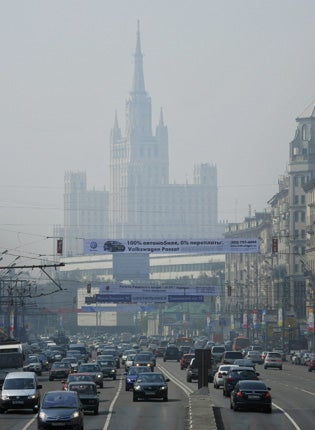Moscow struggles to cope as mercury soars

Your support helps us to tell the story
From reproductive rights to climate change to Big Tech, The Independent is on the ground when the story is developing. Whether it's investigating the financials of Elon Musk's pro-Trump PAC or producing our latest documentary, 'The A Word', which shines a light on the American women fighting for reproductive rights, we know how important it is to parse out the facts from the messaging.
At such a critical moment in US history, we need reporters on the ground. Your donation allows us to keep sending journalists to speak to both sides of the story.
The Independent is trusted by Americans across the entire political spectrum. And unlike many other quality news outlets, we choose not to lock Americans out of our reporting and analysis with paywalls. We believe quality journalism should be available to everyone, paid for by those who can afford it.
Your support makes all the difference.Moscow sweltered through its hottest day since records began 130 years ago yesterday, as temperatures hit 37.4C to spark peat fires that blanketed the city in smog.
A heatwave has engulfed central parts of European Russia and Siberia since June, destroying crops covering an area the size of Portugal. Green groups, including Greenpeace, say the temperatures are evidence of global warming.
"The all-time record has been broken, we have never recorded a day this hot before," said Gennady Yeliseyev, of Russia's state weather agency. The previous high of 36.8C was recorded on 7 August 1920, he said. "The new record could be broken by Wednesday," he said. Muscovites have struggled to deal with the heat, with most electronics retailers selling out of fans and air conditioners, and many cafes running out of ice and cold beer by early afternoon.
Women were using golf umbrellas to shield themselves from the sun on Red Square. Bloggers have begun to complain of men travelling with bare torsos on the metro.
"This summer is very hard, physically and emotionally," said accountant Marina Veselkova, cooling off by a fountain near the Bolshoi Theatre after sending her children away to relatives.
"It's very bad," said Alexander, a courier. "I go to the beach at the weekends but it's difficult to swim because the water is so hot."
Russian grain prices soared last week as the drought took hold. The Agriculture Ministry said on Friday that by 22 July drought had killed crops over 38,600 square miles.
Muscovites' discomfort was compounded on Monday by a blanket of smog, whose sharp, cinder-filled smell permeated the city and crept into offices, homes and restaurants.
The emergencies ministry said 34 peat fires and 26 forest fires were blazing yesterday in the area surrounding Moscow, covering 59 hectares.
"Muscovites will have to inhale smoke for another two to two-and-a-half months," said Alexei Yaroshenko, head of the forest programme at Greenpeace Russia. He said the smoke could eclipse the worst smog registered in Moscow, in 1872 and 1837. Airports serving Moscow were unaffected by the smoke.
"This is awful. It is going to damage people's health," said telephone engineer Davit Manukov, 25, standing by the cloud-shrouded Kremlin.
The Moscow government agency overseeing air pollution, Mosekomonitoring, told Reuters the amount of harmful impurities in Moscow's air exceeded the norm by up to eight times.
Join our commenting forum
Join thought-provoking conversations, follow other Independent readers and see their replies
Comments